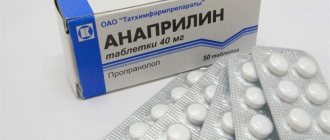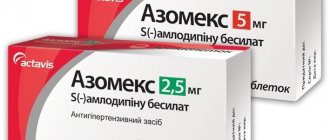To activate and normalize metabolic processes in the heart muscle, as well as eliminate tissue hypoxia, Riboxin is prescribed.
To achieve the desired effect when using the drug, it is necessary to familiarize yourself in detail not only with the indications, but also with the side effects of Riboxin.
The drug is available in the form:
- red hard gelatin capsules with white powder inside;
- two types of tablets;
- solution for intravenous injection.
The main ingredient of Riboxin is inosine, a nucleoside, a chemical precursor of adenosine triphosphoric acid (ATP), which is a universal source of energy for all biochemical processes in the body.
Penetrating into the cell, the active component helps to increase their energy balance and stimulates the synthesis of nucleoside phosphates.
Riboxin is produced by numerous pharmaceutical enterprises in the post-Soviet space
Riboxin has the following effects:
- Anabolic. Promotes the formation and regeneration of damaged cardiac muscle tissue, as well as the gastrointestinal tract.
- Activates the Krebs cycle, which leads to improved respiration at the cellular level.
- Accelerates microcirculation of biological fluids. It enhances capillary circulation and the transportation of blood and lymph, as a result of which the area of necrotic changes in the myocardium during infarctions becomes smaller, and the risk of developing coronary artery disease is significantly reduced.
- Is a participant in energy exchange. The active component of Riboxin affects the metabolism and utilization of glucose - the main source of energy, which ensures the normal passage of any processes in the body.
- Improves metabolic processes when there is a lack of oxygen in tissues or individual organs.
The drug has the greatest effect on the myocardium and liver. Activation of metabolic processes in organs leads to:
- increasing cell resistance to hypoxia;
- restoration of normal conduction of electrical impulses, resulting in normalization of heart rhythm;
- improving blood supply to the kidneys and heart muscle, as well as tissue respiration;
- reducing the risk of blood clots;
- decreased platelet aggregation;
- increased myocardial contractility;
- improving the recovery ability of the myocardium after heart attacks;
- prevention of chronic cardiovascular failure and thromboembolism;
- restoration of the liver in case of pathological changes;
- better regeneration of stomach tissue with erosive and ulcerative lesions.
Riboxin is not a drug with a pronounced effect, but its use together with other drugs significantly improves the patient’s condition.
Riboxin is used in conjunction with other drugs to combat:
Cardiovascular pathologies:
- cardiac ischemia;
- heart rhythm disturbances;
- intoxication caused by the use of cardiac glycosides;
- cardiomyopathies;
- consequences of myocardial infarction;
- angina pectoris;
- myocarditis caused by physical overload;
- congenital and acquired heart defects.
Pathological changes in the liver:
- hepatitis;
- fatty degeneration caused by excessive alcohol consumption or medications;
- cirrhosis.
Urocoproporphyria.
Open-angle glaucoma with normal intraocular pressure by normalizing vision.
Ulcerative lesions of the stomach and duodenum.
Radiation burns. The drug promotes their speedy healing and prevents a decrease in the number of leukocytes in the blood.
Riboxin gets good reviews from people involved in sports, especially strength sports.
A non-steroidal anabolic drug is taken by athletes together with steroids mainly during bodybuilding and powerlifting and leads to:
- increasing the elasticity of vascular walls;
- maintaining the level and capacity of hemoglobin;
- normalization of insulin synthesis;
- maintaining the heart muscle;
- stimulation of carbohydrate absorption.
The use of the drug does not affect the growth of strength indicators and muscle mass. But it restores carbohydrate, protein and fat metabolism, leads to an increase in the body’s protective properties and an increase in the effectiveness of training.
What is Riboxin
A drug based on inosine, a precursor of adenosine triphosphate. Regulates blood circulation, absorption of glucose by cells, restores nutrition to the myocardium. Several pharmaceutical forms of Riboxin are produced:
- tablets: yellow, coated, contain 200 mg of active substance, packaged in cell blisters, packed in 10–50 pcs.;
- Riboxin Lect: soft gelatin capsules containing 200 mg of inosine, up to 50 pcs. in one package;
- 2% solution for parenteral administration: a clear, water-based liquid in ampoules of 5–10 ml, used for injection.
Oral medications contain starch, gelatin, sucrose, glycerin and other formative substances.
Contraindications
Contraindications to the use of Riboxin can be absolute or relative.
The use of Riboxin is definitely not recommended in case of hereditary or acquired intolerance to both the main and additional components of the drug or hypersensitivity to them.
The few contraindications and side effects, as well as the reasonable price of Riboxin, allow it to be used by almost all categories of patients
So, if the injection solution is produced only on the basis of inosine (20 mg/l), then capsules and tablets are produced containing the active component and:
- calcium stearate;
- potato starch;
- powdered sugar;
- mixture covering the solid dosage form: Indigo carmine (E 132), titanium dioxide (E 171), Macrogol (polyethylene glycol 3000), iron oxide (E 172), Quinoline yellow (E 104).
Gouty arthritis
The main active component of Riboxin is inosine, which is involved in the metabolism of purines, the destruction of which produces uric acid. This process is not anomalous.
However, high dosages of Riboxin, its use over a long period of time, mainly in the form of intravenous injections, provoke a significant increase in the level of uric acid and its deposition in various tissues of the body, especially in tendons and joints. This accumulation of the substance leads to a metabolic disease - gouty arthritis (gout).
Uncontrolled use of Riboxin in rare cases provokes relapses or exacerbation of the disease.
Hyperuricemia
Hyperuricemia (increased levels of uric acid in the blood plasma) is also a contraindication for taking Riboxin.
Excessive amounts of the substance in the body when using the drug leads not only to attacks of gout, but also to kidney failure when uric acid crystals block the kidney tubules.
The effect of Riboxin on the amount of uric acid makes it necessary to use it carefully and under the supervision of a doctor in case of kidney diseases or undergoing a course of chemotherapy. The medication should be taken with regular checks of uric acid in the patient's urine and blood.
Diabetes
There is an opinion that diabetes mellitus is a contraindication for the use of Riboxin. However, the instructions for use of the drug do not say anything about this.
On the one hand, by eliminating tissue hypoxia, which is often observed in diabetics during hypoglycemia, the drug can only be beneficial. On the other hand, an increase in uric acid levels due to the use of Riboxin contributes to an increase in the body's resistance to insulin, which is extremely undesirable.
For diabetes mellitus, any drug should be used under the supervision of specialists. Riboxin is no exception. Only after determining the balance of benefit and harm from the drug can be included in the therapy.
Also, the use of the product is not recommended for lactose and fructose intolerance, impaired absorption of glucose, galactose, as well as in case of sucrose or isomaltase deficiency.
Arterial pressure
Riboxin does not have a direct effect on blood pressure, and experts consider it inappropriate to use this drug to normalize its levels.
However, by improving metabolic processes in the body, the drug indirectly leads to its reduction.
Hypotension is not an absolute contraindication to the use of the drug, but causes caution in its use.
Pregnancy and childhood of the patient
Despite the lack of clinical studies on the effects of the drug on the body of lactating and pregnant women, the prescription of Riboxin during this period is often observed.
The drug is able to overcome the placental barrier, but its toxic effect on the body of the unborn child has not yet been identified. A drug:
- improves muscle formation of the fetus;
- eliminates fetal hypoxia;
- used to treat severe forms of placental insufficiency.
The use of the drug by expectant mothers may be due to an increased risk of ischemia and heart failure:
- obesity;
- antisocial lifestyle;
- insufficient or poor quality nutrition;
- smoking or alcohol abuse, etc.
There is also no data on the penetration of Riboxin into breast milk and its effect on the baby’s body.
The instructions for use of the drug prohibit its use until the patient reaches the age of 18 due to the lack of data on its effectiveness and safety in childhood.
It is worth considering that Riboxin is incompatible with vitamin B6, acids, pyridoxine hydrochloride and alcohol.
How does Riboxin work?
Inosine in all types of the drug has systemic effectiveness. It restores metabolism, helps the body adapt to work in conditions of insufficient oxygen supply. The medicine eliminates and prevents the occurrence of arrhythmia in chronic vascular diseases. Regular use helps normalize myocardial contractility and reduce ischemic disorders.
The therapeutic effect increases with the course of taking the drug. In the blood, inosine actively stimulates tissue metabolism, ATP production, smoothes out the manifestations of bradycardia, tachycardia, increases the force of contraction of the heart muscle and promotes better relaxation.
Riboxin has a moderate antiplatelet effect: it improves blood fluidity and prevents platelet aggregation. Another therapeutic effect of the drug is biostimulating. The medicine accelerates the regeneration of muscle fiber cells and mucous membranes.
Side effects
In rare cases, Riboxin leads to side effects that manifest themselves:
- allergic reactions in the form of skin rashes, hyperemia, itching;
- decreased blood pressure;
- increased concentration of uric acid in the body;
- rapid heartbeat;
- exacerbation of gouty arthritis;
- rapid heartbeat;
- dizziness and persistent headache;
- increased sweating;
- anaphylactic shock.
If side effects occur, you must stop using the drug
When administering the drug by injection, local reactions such as redness and itching at the injection site cannot be excluded.
To avoid side effects of Riboxin, its use should be agreed with your doctor.
For what diseases is Riboxin used?
The main area of medicine in which the drug is in demand is cardiology. Riboxin is prescribed:
- for coronary insufficiency, angina pectoris, and other manifestations of cardiac ischemia;
- to relieve disorders in patients after a heart attack;
- in case of intoxication with cardiac glycosides;
- for cardiac arrhythmias of various origins;
- with dystrophic changes in the myocardium due to physical exhaustion, endocrine pathologies.
In the complex treatment of diseases of internal organs, Riboxin is used due to its regenerating and metabolic effects. Main indications:
- liver damage: hepatosis, hepatitis, cirrhosis;
- gastric ulcer, erosive changes in the intestinal mucosa;
- open-angle glaucoma with stable intraocular pressure;
- pathological conditions after radiation and chemotherapy.
Reviews
Alexey Mikhailovich Muranov, cardiologist (Kharkov) Modern medicine has at its disposal more effective means than Riboxin. The medicine is quite popular, has a low price and rarely occurs minor side effects, there are also few contraindications. Prescribed when no serious illness has been identified, often for the placebo effect.
Anatoly Vasilyevich Smirnov, Omsk, 60 years old Since childhood, he has been involved in weightlifting at a professional level. Coaches, with the permission of doctors, always prescribed Riboxin not only to me, but also to other athletes. It was believed that the drug greatly increases endurance. Personally, with constant training, I never noticed a clear effect from the medicine, but there were no side effects.
Svetlana, Belgorod, 48 years old A neighbor advised me to take Riboxin to support my heart activity. The medicine is popular, cheap, and accessible. Of course, I didn’t consult a doctor. I took one tablet three times a day before meals for a week. Then pale pink rashes appeared on the skin, which were very itchy. Doctors diagnosed a nettle rash, which was a side effect of the medication. As soon as I stopped taking it, the rash went away.
Is Riboxin allowed for pregnant women?
Expectant mothers need more nutrients, the absorption of which is questionable due to hypoxic disorders. In this situation, Riboxin improves metabolism, ensures better energy exchange, eliminates the effects of oxygen starvation, and prevents the development of cardiac complications.
Riboxin injections are used more often than tablets as a faster way to deliver medicine into the blood. The drug is administered orally to pregnant women, usually at home, according to an individual dosage regimen.
Use of the drug Riboxin
Tablets: orally before meals in a daily dose of 0.6–2.4 g. For the first time, take 0.6–0.8 g/day (0.2 g 3–4 times a day), and if well tolerated, increase the dose for 2–3 days up to 1.2 g/day in 3 divided doses and up to 2.4 g/day. The course of treatment lasts from 4 weeks to 1.5–3 months. For urocoproporphyria, Riboxin is taken in a daily dose of 0.8 g (0.2 g 4 times a day) daily for 1–3 months. Injection. Adults and older children are prescribed intravenous drip or bolus. Initially, 200 mg (10 ml of 2% solution) is administered once a day, then, if well tolerated, up to 400 mg (20 ml of 2% solution) 1–2 times a day. The course of treatment is determined individually (on average 10–15 days). When administered drip into a vein, 2% solution of the drug is diluted in 5% solution of glucose or isotonic solution of sodium chloride (up to 250 ml). The drug is administered slowly, 40–60 drops per minute. In case of acute cardiac arrhythmias, jet administration in a single dose of 200–400 mg (10–20 ml of 2% solution) is possible.
Therapeutic effect
Riboxin has a pronounced antihypoxic effect, regulates metabolic processes and prevents heart rhythm disturbances in various vascular pathologies. The drug restores the nutrition and energy of the myocardium, improves blood flow in the coronary vessels, and treats the consequences of ischemia.
Inosine has a systemic effect on the body. The therapeutic effect increases over time.
- Penetrating into the blood, it is actively involved in glucose metabolism, stimulates tissue respiration and ATP synthesis.
- Prevents the negative consequences of oxygen starvation of cells under hypoxic conditions.
- Significantly increases the strength of heart contractions, improves myocardial contractility, preventing circulatory disorders, the development of tachycardia, bradycardia and other types of arrhythmia.
- Slows down platelet aggregation, improves blood fluidity.
- Promotes tissue regeneration, including gastrointestinal mucosa and muscles.
Riboxin quickly dissolves and is absorbed in the stomach cavity and actively interacts with blood proteins. In the liver, the active substance is converted to glucoronic acid, which is oxidized without releasing toxic metabolites. A small part of the drug is excreted through the kidneys and intestines. The drug is not retained or deposited in the body.







